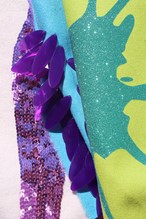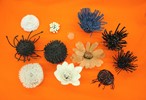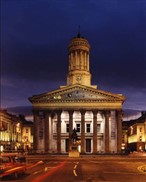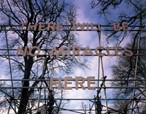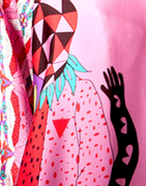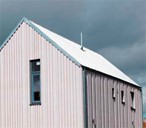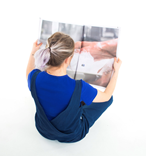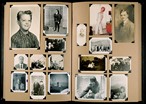This programme, established in 2014 and jointly run by The Glasgow School of Art and the University of Glasgow, offers students the opportunity to study curatorial practice in Glasgow, a city with a vibrant and distinctive international art scene. Throughout the year students are supported to identify and undertake individually motivated curatorial projects and research as the basis for the development of a self-sustaining practice, making this programme distinctive in its delivery.
During this intensive one-year programme, students work closely with artists and a range of organisations, as they consolidate and articulate their practice within an international context of theory and practice. There is a balance between theoretical exploration and critique, where writing and concept-formation are challenged and developed by practical application and experimentation.
There is the opportunity to work both individually and collaboratively at different stages in the year on projects that extend beyond exhibition-as-form, to include performance-based work, publications, digital platforms and other discursive modes of curation.
The curriculum is designed to support the development of students’ curatorial practice throughout the year:
- Stage 1 focuses on situating practice and theory, guiding students to ground their research collaboratively through connecting with peers, curators, artists and publics in the city.
- Stage 2 encourages the development of local-international conversations and a deepening of students’ own curatorial positions, with teaching that responds to the specific research interests brought in every year by each cohort.
- Stage 3 shifts focus towards independent practice, as students undertake a substantial curatorial project, research piece, or a combination of both.
The programme proposes an exchange between curating as a process, connected to visual arts theory and practice, and its inter-disciplinary expansion through curatorial discourse. Teaching is a constellation of lectures, tutorials, practical workshops, and focused study days. There is an emphasis on independent work and peer-critique, where the discussion of projects allows students to find their curatorial voice and have the opportunity to develop a methodology of working that they can take forward post-Masters.
It is appreciated that there will be multiple interests in the programme, and as such the programme fosters diverse ways of working curatorially and responds to the interests emerging from the cohort. In previous years this has included residencies and support structures, writing-as-practice, feminist and queer projects, self-organised and collaborative work, and events operating. outwith the conventional area of presentation. Equally, the programme offers students the chance to extend their practical and academic skills, with support to refine work for PhD pathways – including practice-based.
It is expected that applicants have a strong understanding of contemporary art, art history and theory gained through study and/or professional experience, upon which to build their curatorial projects and writing during the programme. During the year, students can expect visiting tutors/ lecturers who will lend an international and insightful understanding of the curatorial field and their practice, as well as on-going opportunities to participate in local networks.
The programme is offered jointly between The Glasgow School of Art and the University of Glasgow, and offers links with external institutions in Glasgow and Scotland, including ARIKA, ATLAS Arts, the Centre for Contemporary Art, Glasgow International, Glasgow Women's Library, GoMA, Hospitalfield, Rumpus Room, Tramway, The Common Guild, LUX Scotland, The Alasdair Gray Archive, WAVEparticle, Counterflows Festival, Queens Park Railway Club, Glasgow Sculpture Studios and The Hunterian Museum and Art Gallery.
Quick facts
Students on this programme have the opportunity to:
- Produce a minimum of one public-facing curatorial project per year, which may include an additional presentation as part of their Degree Show in venues across Glasgow every September.
- Access an extensive professional network. Throughout the course students have the chance to meet numerous curators, who are invited to teach on the programme, and are encouraged to conduct studio visits with a range of artists. In addition to this, ten students every year have the possibility of undertaking a placement tailored to their interests either within the city or further afield.
- Benefit from a diverse taught provision, balancing lectures and seminar-based sessions with close peer-to-peer critique, practical workshops and tutorials. In addition to this, students attend a study day every term on a topic of contemporary relevance.
- Be part of two postgraduate student communities, as teaching takes place across the School of Fine Art at the Glasgow School of Art and the School of Culture and Creative Arts at the University of Glasgow. This opens up the possibility of interdisciplinary collaboration and learning.
- Core to the programme is the accommodation of the students alongside the Fine Art Practice students at The Glasgow School of Art. Students have access to a studio/project space and are encouraged to test and develop projects alongside practicing Fine Art students.
- The programme attracts students from all over the world and fosters collaboration with a growing network of international partners, all contributing to a rich learning environment.
Entry requirements
A good Undergraduate Degree in a relevant subject (normally 2:1 or higher - although a lower classification may be considered where other areas of the application are strong) or equivalent professional or life experience. A good level of understanding of contemporary art, relevant to the applicant's own cultural context. Candidates will undertake an interview before selection.
International students
International students will need to have an IELTS 6.5 (min 5.5) or equivalent qualification in English language in addition to the other entry requirements listed above.



